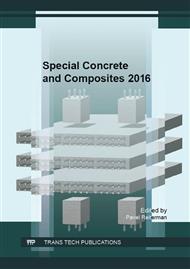p.305
p.311
p.316
p.325
p.331
p.337
p.343
p.351
p.357
Gypsum Mortars with Different Types of Aggregates: Design and Properties
Abstract:
The influence of different types of fine aggregates on behavior and properties of gypsum mortars was investigated. The design procedure and results of some basic physical tests are described. The composition of mixtures was designed in order to minimalize all other impacts than type of aggregate. Four types of fine aggregates of different origin, with different shape and surface of particles were used. The presence of fine aggregate in gypsum increases the bulk density and reduces setting time. Crushed stone with angular rough particles worsen workability and reduce setting time more significantly than aggregates with round and smooth particles.
Info:
Periodical:
Pages:
337-342
DOI:
Citation:
Online since:
December 2016
Authors:
Keywords:
Price:
Сopyright:
© 2017 Trans Tech Publications Ltd. All Rights Reserved
Share:
Citation:


